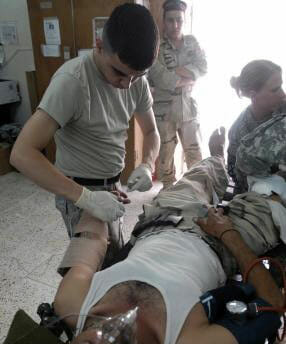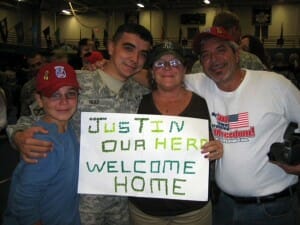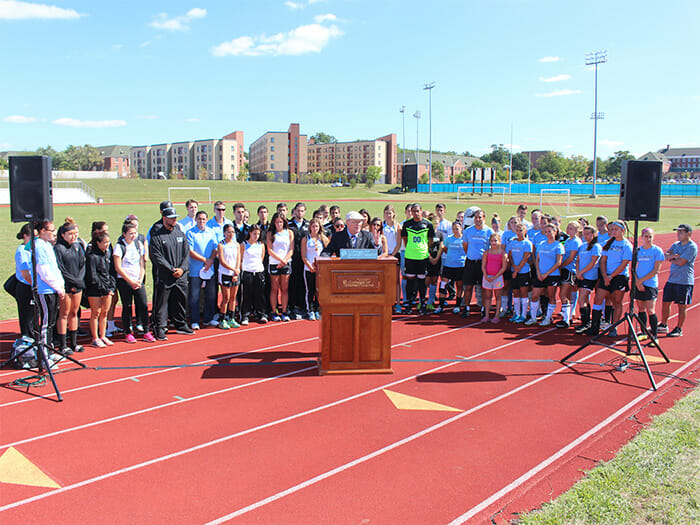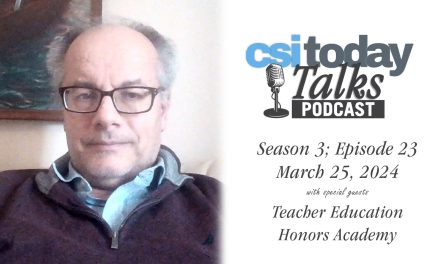“Do you know how many times I slipped and fell last year? I was black and blue.” Justin Ruiz was taking a break from a meeting of the CSI Student Veterans of America (SVA) club to discuss an award that is aimed at changing all that: On Nov. 8, he will be presented with a car by Progressive Insurance.
It’s a fitting award for the Computer Science junior. His military service, which began with the Air Force as a laboratory technician, and ended with the Army as a combat medic, after a 15-month tour in Iraq, has made a mess of his knees.
“When I was in Iraq, all the equipment I was carrying messed up my knees,” Ruiz said. “Sometimes people don’t know that in addition to all of the body armor and weapons, a medic carries 55 pounds of medical gear. We’re soldiers first and medics when someone needs treatment.”
Ruiz is not a complainer – he probably would have soldiered on to graduation despite the pain of standing, not to mention an hour’s commute to campus each way. But Veterans Support Services Director Laura Scazzafavo is not an idler.
“I saw this award and I knew it would be perfect if he got it,” Scazzafavo said. “It seemed like the perfect fit.”
Scazzafavo put together an application. Ruiz went in for an interview for the Progressive Keys to Progress Award. The ceremony is taking place Nov. 8 at the Fort Hamilton Army Base in Brooklyn.
“The guy asked me, ‘What would you do with a car?’” Ruiz recalled. “And I said, ‘My girlfriend comes from New Jersey to pick me up and take me places. I’d like to take her to Coney Island – I want to take her places.’”
On Nov. 8, Ruiz will get the 2015 Honda CRV .
“I was in some shock when I heard I won it.”
Scazzafavo’s initiative at least partly explains why the College of Staten Island is routinely ranked as one of the nation’s top Military Friendly Schools; last year it was Number 1, according to the publisher of G.I. Jobs, STEM Jobs, and Military Spouse. And that makes a difference to student-veterans, students like Ruiz whose stories could fill volumes.
“I didn’t know what to expect going in” to Iraq, he recalled. “As a medic, 80 percent of the time was the most boring thing – you’re just missing everybody and home comforts. Another ten percent is the administrative stuff you have to do. And ten percent is hellish.”
Ruiz’s knees were not the only casualties. He also suffered post-traumatic disorder syndrome – he’d shut down emotionally, get distant.
“I feared every second during those hellish times – if I’d see my family again, were they going to be taken care of. Those were the times of the actual war – the shootings, the bombings, the explosions – when it went to 400 on a scale of one to ten.
“I couldn’t deal with emotions when I got back. I had to learn to deal with all that again when I came back.”
At CSI, Scazzafavo, a Navy veteran, has helped student-veterans find their way in college. Student veterans – there are about 300 currently enrolled – do get first dibs on registration for classes, but beyond that, there are not many perks.
“When I enrolled at CSI, they immediately brought me to Laura,” Ruiz recalled. “Laura has been my only real veterans support – from practical to financial to paperwork.”
At a recent meeting of the SVA club, about a dozen students crammed into a room in the Campus Center. They were planning a haunted hallway activity for Halloween: “You just need to scare people,” Naomi Gordon, who is in the Army, told the group as she asked for volunteers. Gordon is the club’s events coordinator.
Brendan Pirando, an Accounting junior and the club’s treasurer, reminded members that they still had to figure out who could go to a national conference on employment opportunities for veterans. Pirando, a member of the U.S. Navy Reserves, said the club gave him a sense of belonging, particularly after he arrived at CSI from basic training.
“I think it’s helpful because you have that environment where people have had military experience,” Pirando said. “It makes you feel more welcome and at home. This was the one place where I felt like I really belonged. Everyone was very welcoming.”
CSI’s accommodations for student-veterans make a difference, Pirando said.
“Everybody’s very respectful” of student-veterans, Pirando said. “Professors will excuse you or give you extensions when you have drills. Students are very understanding. And other veterans on campus – they know where you’re coming from if you have personal issues.”
The club is not only social – members have also worked to address glaring inequities for student veterans at CSI. For example, students who have completed four years of active duty are entitled to a housing allowance; on Staten Island, it’s about $2,700 a month, but in other boroughs it’s much higher.
“That is an issue,” Pirando said. “We’re in contact with Congressman Donovan. SVA is headquartered in DC and they have lawyers and politicians they work with, to make the process a little bit better.”
CSI Today reported about Rep. Donovan’s visit to discuss the housing allowance disparity in April.
















